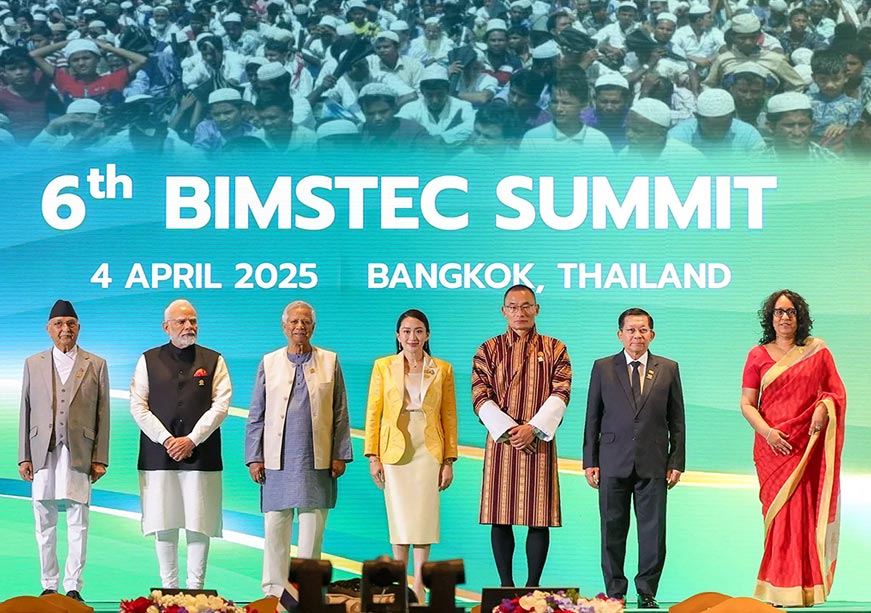-
CENTRES
Progammes & Centres
Location
Can BIMSTEC fill the regional governance void in addressing the Rohingya crisis, where ASEAN and SAARC have faltered? Bangladesh and India can drive multilateral action by linking humanitarian stabilisation in Rakhine with regional security and economic cooperation.

The Rohingya refugee crisis remains one of the most pressing issues of statelessness in the twenty-first century, shaping South Asia’s human rights discourse and migration governance. A Muslim ethnic minority group in the Rakhine state of Myanmar, the Rohingya are the world’s largest stateless population ever since they were denied citizenship in 1982. Decades of persecution escalated in August 2017, triggering one of the largest mass displacements in recent history, forcing over 742,000 Rohingya, half of whom were children, to escape human rights violations. Today, Bangladesh hosts around one million Rohingya, but has not granted them settlement or legal recognition. India has taken a stringent approach, marked by detentions, deportations, and exclusionary rhetoric. Regional organisations, including the Association of Southeast Asian Nations (ASEAN) and the South Asian Association for Regional Cooperation (SAARC), have failed to develop coherent frameworks, leaving refugees vulnerable to trafficking, poverty, and death. International law instruments—such as the 1951 Refugee Convention and the 1954 Convention on the Status of Stateless Persons—are not widely ratified in South Asia, thereby limiting their reach. This raises the question: can the Bay of Bengal Initiative for Multi-Sectoral Technical and Economic Cooperation (BIMSTEC) succeed where others have failed, and can Bangladesh and India lead the way?
Against the seeming failure of ASEAN and SAARC in addressing the Rohingya refugee crisis, the role of BIMSTEC has been called into question.
Despite the crisis’s regional nature, South Asian and Southeast Asian institutions have been unable to address the issue adequately. SAARC has remained functionally paralysed due to long-standing political rivalries and lacks a legal framework for refugees. Owing to the principle of non-interference, ASEAN has only made symbolic gestures, such as conducting a needs assessment in Rakhine and calling for humanitarian aid. Myanmar continues to view ASEAN as an unbiased institution. Hence, it is highly doubtful that the bloc will risk jeopardising its legitimacy by adopting a strong stance. Myanmar’s refusal to follow ASEAN's 2021 five-point consensus further exposes the bloc’s unwillingness to take a firm stance, underscoring a lack of collective resolve. Against the seeming failure of ASEAN and SAARC in addressing the Rohingya refugee crisis, the role of BIMSTEC has been called into question.
Bangladesh utilised BIMSTEC as a regional negotiation platform, refusing to meet Myanmar’s leaders until the country recognised the 180,000 Rohingya from Dhaka's verified list as being eligible for return.
BIMSTEC, for its part, has so far avoided the Rohingya issue to preserve economic cohesion. During the 2018 summit, the issue was absent from the agenda as no member state had proposed it, so as to avoid confrontation with Myanmar. At the 6th summit in April 2025, Bangladesh’s Chief Adviser Muhammad Yunus urged member states to take more visible steps to facilitate the voluntary repatriation of Rohingya refugees. In an unprecedented move, Bangladesh utilised BIMSTEC as a regional negotiation platform, refusing to meet Myanmar’s leaders until the country recognised the 180,000 Rohingya from Dhaka's verified list as being eligible for return. While this marked a shift from bilateral dependency to multilateral assertiveness, integrating the crisis into BIMSTEC’s mandate remains necessary.
ASEAN’s diplomatic constraints and Myanmar’s refusal to offer safe repatriation make India and Bangladesh key players in the formulation of regional action. Bangladesh remains at the epicentre, struggling to battle resource constraints amidst a million refugees residing in makeshift shelters. India is torn between its obligations under a legacy of humanitarianism and the need to safeguard economic and strategic interests, ultimately deeming the Rohingya as illegal immigrants and pursuing deportations.
Rohingya refugees in Bangladesh depend solely on humanitarian aid for shelter, food, water, health care, and protection. Bangladesh, which ranked third worldwide in disaster vulnerability, is exposed to cyclones, flooding, and landslides. Recent aid cuts have reduced food assistance. Only 30 percent of refugees are able to access safe drinking water, and 85 percent are without adequate sanitary conditions, resulting in disease outbreaks. Gender-based violence remains a steady concern. The impact of hosting Rohingya refugees has been severe on Bangladesh’s economy. Environmental consequences are significant, with approximately 1500 acres of social forest (those set up on degraded lands through community involvement to benefit local communities) cleared up to provide shelter and firewood. Host communities that were initially sympathetic now express resentment, fuelling social tension.
In October 2023, Bangladesh's Foreign Minister A.K. Abdul Momen asserted that repatriation, not local integration, is the only sustainable solution and remarked that Bangladesh, already burdened with a large population, could not permanently accommodate an additional community.
Repatriation has long been Bangladesh’s preferred and primary solution. After the 2017 mass exodus, Dhaka signed a bilateral agreement with Myanmar toward this end. However, two previous attempts at repatriation, in 2018 and 2019, did not succeed. In October 2023, Bangladesh's Foreign Minister A.K. Abdul Momen asserted that repatriation, not local integration, is the only sustainable solution and remarked that Bangladesh, already burdened with a large population, could not permanently accommodate an additional community. A 2023 joint repatriation plan for around 1,000 Rohingya did not gain the trust of the refugees, as it provided no guarantees of return to their original homes, nor did it address the fundamental issues of citizenship and security. Hence, the UNHCR opposed the plan, defining conditions in Rakhine as unsafe.
After the Awami League government was deposed in 2024, the new interim government, headed by Chief Adviser Mohammed Yunus, reaffirmed Bangladesh's commitment to supporting the Rohingya but called for broader international cooperation to ensure that the repatriation arrangements are sustainable in the long run. The Bangladesh Nationalist Party echoed this shift from bilateralism, while the more religiously fundamentalist Jamaat-e-Islami proposed establishing an independent Rohingya state in talks with Chinese officials.
India’s approach to the Rohingya crisis has been marked by caution, reflecting New Delhi’s intent to maintain stable bilateral relations with Myanmar. In 2012, Indian External Affairs Minister Salman Khurshid visited Myanmar and announced aid worth US$1 million for the violence-hit Rakhine state. India was also involved in the construction of a port in Rakhine to connect Indian cargo vessels to Southeast Asia, thus tying Indian interests with the stability of the region. By the time the NDA government assumed power, the Rohingya crisis had taken a complex dimension, with countries like Thailand and Malaysia turning back hundreds of refugee boats in 2015, and ASEAN largely silent. India chose not to intervene directly, likely guided by its desire to protect its economic and strategic interests in Myanmar, including key cross-border infrastructure and energy initiatives.
India’s approach to the Rohingya crisis has been marked by caution, reflecting New Delhi’s intent to maintain stable bilateral relations with Myanmar.
As India continues to detain and deport the Rohingyas, the Supreme Court, in a recent development, ruled that they are foreigners and declined to halt their deportation. However, even as India has hardened its domestic stance, it has simultaneously begun to recalibrate its regional engagement. Building on a cautious approach aligned with its Neighbourhood First policy, Delhi has sought to contribute constructively to regional efforts aimed at resolving the crisis. In 2017, India signed an MoU with Myanmar, committing US$25 million over five years towards socio-economic development in Rakhine State, indicating a more constructive approach to engagement and away from political confrontation. Yet, instability in Rakhine State directly affects India’s Northeast, jeopardising connectivity initiatives such as the Kaladan Multi-Modal Transit Transport Project and the India-Myanmar-Thailand Highway.
India's decision to deport Rohingya refugees has drawn criticism, particularly in light of its longstanding tradition of offering refuge to displaced communities. Critics argue that the deportations, coupled with the Supreme Court ruling, violate the customary international law principle of non-refoulement, which applies to India despite its non-signatory status to the Refugee Convention.
Bangladesh and India can act on two strategic fronts within BIMSTEC to advance coordinated regional solutions. Bangladesh can invoke Article 1(7) of the new BIMSTEC Charter, which provides for inter-state cooperation to address transnational organised crime. Addressing how the Rohingya crisis has fuelled human trafficking and cross-border instability will allow for discussion from the perspective of regional security. A BIMSTEC Task Force dedicated to coordinating humanitarian aid and reducing over-reliance on external donors can also be proposed to ensure voluntary, safe, and dignified repatriation through collective diplomatic engagement with Myanmar. Exploring regional resettlement quotas or temporary protection schemes may facilitate an equitable distribution of responsibilities. BIMSTEC can offer Bangladesh and India a platform to depoliticise the crisis, focus on the shared concerns, and advance a collective solution.
BIMSTEC’s original emphasis on economic cooperation provides a diplomatic entry point. Bangladesh could advocate for linking humanitarian stabilisation in Rakhine State with BIMSTEC’s economic and technical cooperation agenda, encouraging member states to channel bilateral or joint investments into development initiatives in Myanmar. If Myanmar can be incentivised to create conditions for the safe return of the Rohingya, economic incentives coordinated via BIMSTEC might carry more weight than external pressure alone. India also has significant economic interests in Myanmar—including energy pipelines, infrastructure investments, and trade corridors. By linking economic cooperation with gradual and verifiable progress on the repatriation of, and rights for, the Rohingya, India can exert quiet diplomatic pressure.
Exploring regional resettlement quotas or temporary protection schemes may facilitate an equitable distribution of responsibilities. BIMSTEC can offer Bangladesh and India a platform to depoliticise the crisis, focus on the shared concerns, and advance a collective solution.
To achieve a sustainable solution, it is in India’s interest to engage diplomatically with actors beyond the military junta. As the civil war continues to rage in Myanmar, the junta’s grip continues to weaken due to territorial losses to ethnic armed groups. The Arakan Army has captured 15 of the 18 townships in Rakhine state. India, while maintaining constructive ties with Naypyidaw, must practice quiet, multilevel diplomacy and advocate for Myanmar’s enhanced participation in the BIMSTEC. New Delhi’s engagement must extend beyond the central military regime and include ethnic organisations and resistance-aligned civilian voices closely linked to on-ground governance structures. This broader inclusion would better reflect Myanmar’s internal realities, grant a voice to those exercising de facto authority in areas like Rakhine, and lend legitimacy to discussions on safe repatriation and security guarantees. Such an approach can enhance the credibility and effectiveness of any BIMSTEC-led effort while also protecting Indian interests in the region.
Anasua Basu Ray Chaudhury is a Senior Fellow with the Neighbourhood Initiative at the Observer Research Foundation.
Sreedipta Roy is an Intern at the Observer Research Foundation.
The views expressed above belong to the author(s). ORF research and analyses now available on Telegram! Click here to access our curated content — blogs, longforms and interviews.

Anasua Basu Ray Chaudhury is Senior Fellow with ORF’s Neighbourhood Initiative. She is the Editor, ORF Bangla. She specialises in regional and sub-regional cooperation in ...
Read More +